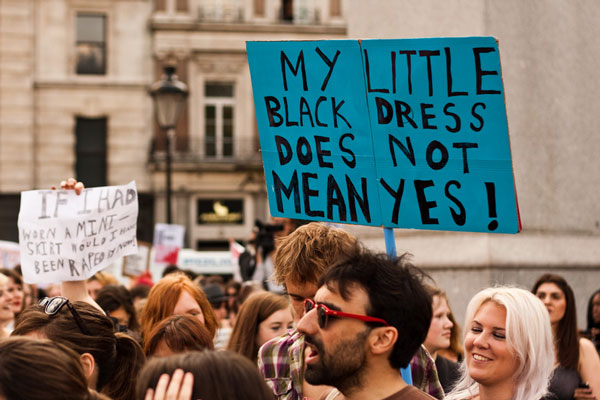American social commentator Cathy Young recently wrote an article for the The Age entitled ‘The dream of “perfect sexual consent” has a nightmare tinge’. In it, she begins by regaling us with the times she was either ‘guilt-tripped’ into sex or ‘didn’t have the nerve to say no.’ It was a personal showcase of experiences of coercion; yes, she can relate to women who have had sex even when they’ve said they didn’t want to. It was complex. It was ‘complicated’. It was a ‘mistake’.
And then there are her reflections on being a ‘perpetrator’ herself.
The time she was told ‘no’ by a man and realised she was pressuring him rather than seducing him. Then there’s that other time that a man told her it was too soon and ‘we shouldn’t be doing this’ but they stayed in bed anyway. This juxtaposition is supposed to show us that consent is murky and that we all cross lines, no matter our gender. But none of her stories are about her saying no explicitly, of refusing consent, so she is deliberately muddying the water. Reading this, three different points occur to me:
- Culturally, women are still taught that they can’t say no because they must, after four waves of feminism, be good girls and not rock the boat.
- Women are only just learning that they have a voice and they are allowed to use it
- Just because she didn’t know how to say no like the man she pressured did, doesn’t mean everyone, of all genders and sexualities, shouldn’t learn how.
Young claims that advocating for a position around consent and sex is ‘puritanical’, lacks ‘dignity’ and ‘spontaneity’ and basically ruins the messiness of real-life sex, so much so that she calls the quest for consent ‘profoundly utopian’ and its eventual realisation a ‘dystopian nightmare’.
What a joke.
Arguing that asking someone if they want to have sex with you lacks dignity is akin to arguing that we are all entitled to each other’s bodies at all times as long as the other person looks at us in a particular way. Bodies are personal, and women’s bodies in particular need to be reconceptualised as something other than public property to which the male gaze, the wolf whistle and the unrequited sexual advance are just a woman’s lot. The framing of consent as a utopian ideal is to play into the hands of a system that operates on the unspoken discourse of ‘no means yes’. This discourse says that women really want it but are too afraid to say it because if they do they’ll be labelled sluts, easy, not enough of a challenge. It also reinforces the notion that women don’t have the strength to say no. I’m calling 1950s attitudes for what they are: outdated.
The idea that men are from Mars and really, really, sexual, and women are from Venus and just passive sexual participants is the stuff of myth. Women want sex just as much as men but they want it when they want it, not against their will. Conversations around consent make sure both parties are willing participants.
Yes we can, as the subheading to Young’s article reads, ‘discuss sexual ethics based on honesty without turning every lapse into a crime’ because actually, most sexual assaults go unreported. Recent statistics state that only 15 per cent of sexual assaults are reported because of the shame and victim-blaming that goes on. This makes sex crimes one of the most under-reported crimes in Australia.
The rise of consent culture is a very good thing. It contradicts the notion that masculinity equates to an uncontrollable sex drive, negating the age-old idea that men are essentially animals and simply can’t help themselves. Since femininity is a concept developed in response to masculinity, which is understood to be the ‘standard’, when you change ideas about masculinity you necessarily change femininity too.
Pushed to its extreme, our cultural narratives say that women’s desire only fires in response to male persistence. But when the issue of consent is given the air it needs, female sex drive is given a space of its own. Female desire can be dragged out of the closet and exist as a force unto itself. In some ways, female desire is in itself revolutionary because of the still-prevalent ideas that female sexuality is coy, in need of being beckoned out of its cultural shell.
We can no longer go on equating masculinity with the exertion of power and authority. It does a disservice to men’s wellbeing and influences how they learn to treat women. The issue of consent is a key to breaking down and reframing how we perform gender and sexuality. Most importantly, it necessarily transforms how we enact desire with each other. It begs us to change. It asks us to evolve and stretch our definition of what a man and a woman is and how we express our sexuality.
Perfect consent is neither a utopian dream nor the path to a dystopian nightmare. No-one is criminalising too much sex. Ensuring a woman says ‘yes’ does not equate to puritanism. It’s just common cultural sense. It’s cultural evolution. And it’s just in time.
Image: Garry Knight / Flickr






